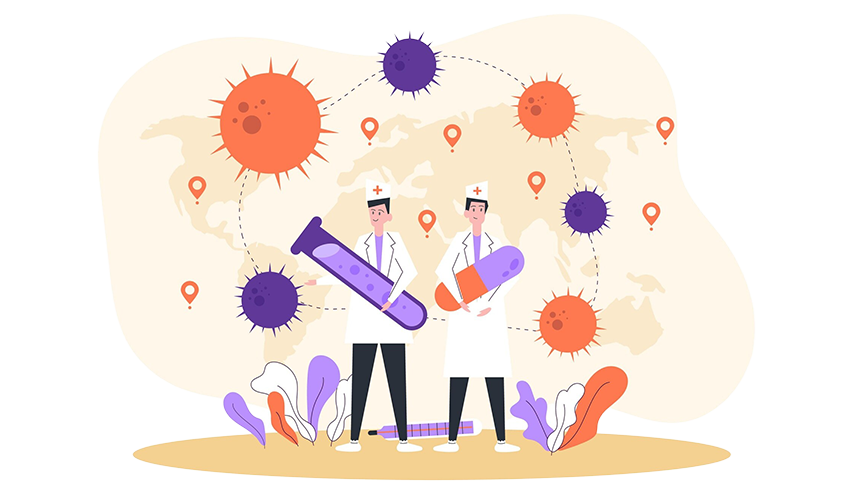This Course Structure is Curated as per the NEP-2020 Guidelines
Course Overview
The M.Sc. Epidemiology in Public Health program at Malla Reddy Vishwavidyapeeth, Hyderabad, is a postgraduate course designed to train students in the principles and practices of epidemiology to address public health challenges. The program equips students with the skills to investigate disease patterns, assess health risks, and develop evidence-based interventions to improve population health.
This program focuses on equipping students with the theoretical knowledge and hands-on skills from 1st semester itself. The curriculum focuses on advanced epidemiological methods, health surveillance, outbreak investigation, and public health policy. Students gain hands-on experience through internships and research projects, preparing them for impactful careers in public health organizations, research institutes, government agencies, and international health bodies. Enabling them to pursue further higher studies & do research in Epidemiology – Public Health along with plenty of job opportunities globally.
Graduates of this program emerge as ‘Skilled Professionals in Epidemiology and Public Health’, enabling them to pursue further higher studies & do research in Epidemiology in Public Health program along with plenty of job opportunities globally.

Course Details
Description: 2 Years Degree Program
No. of Seats: 20
No. of Credits: 80 minimum & as specified
- Eligibility
- Curriculum Structure
- Program Outcomes
- Career Enhancement
- Higher Studies
- Job Roles & Progression
A B.Sc. degree in Public Health, Life Sciences, Statistics, or an equivalent field with at least 50% aggregate marks from a recognized university.
Semester | Name of the Subject |
Semester 1 | Advanced Principles of Epidemiology, Public Health Foundations, Biostatistics for Epidemiology, Health Policy and Systems, Practical: Data Collection and Analysis |
Semester 2 | Epidemiology of Infectious Diseases, Epidemiology of Non-Communicable Diseases, Social Determinants of Health, Global Health Epidemiology, Practical: Disease Surveillance Techniques |
Semester 3 | Outbreak Investigation and Response, Research Methodology and Biostatistics, Health Technology in Epidemiology, Policy Development and Advocacy, Practical: Risk Factor Analysis and Program Monitoring |
Semester 4 | Thesis/Research Project: Independent research on a public health epidemiology topic. |
Internship: Practical exposure in disease surveillance, outbreak investigation, or program evaluation at health organizations, research institutes, or government agencies. |
Semester | Name of the Subject |
Semester 1 | Advanced Principles of Epidemiology, Public Health Foundations, Biostatistics for Epidemiology, Health Policy and Systems, Practical: Data Collection and Analysis |
Semester 2 | Epidemiology of Infectious Diseases, Epidemiology of Non-Communicable Diseases, Social Determinants of Health, Global Health Epidemiology, Practical: Disease Surveillance Techniques |
Semester 3 | Outbreak Investigation and Response, Research Methodology and Biostatistics, Health Technology in Epidemiology, Policy Development and Advocacy, Practical: Risk Factor Analysis and Program Monitoring |
Semester 4 | Thesis/Research Project: Independent research on a public health epidemiology topic. |
Internship: Practical exposure in disease surveillance, outbreak investigation, or program evaluation at health organizations, research institutes, or government agencies. |
- Disease Surveillance and Investigation: Proficiency in tracking and analyzing disease patterns.
- Outbreak Management: Skills in planning and executing outbreak investigations and responses.
- Epidemiological Research: Expertise in designing, conducting, and analyzing research studies.
- Policy Analysis and Development: Ability to evaluate and influence public health policies through epidemiological evidence.
- Global and Local Perspectives: Insights into global health trends and challenges in epidemiology.
- Health Risk Assessment: Knowledge of evaluating health risks and developing preventive measures.
- Certification in Disease Surveillance and Control: Specialized training in tracking and managing disease outbreaks.
- Certification in Outbreak Investigation and Response: Advanced skills in managing public health emergencies.
- Certification in Epidemiological Modeling: Training in predictive modeling for disease patterns.
- Certification in Health Policy Analysis: Focused training in evaluating public health policies.
- Certification in Global Health Epidemiology: Advanced knowledge in addressing global health challenges.
- Ph.D. in Epidemiology or related fields.
- Fellowship in Global Health Epidemiology.
- Postgraduate Diploma in Public Health Data Science.
- Advanced certifications in Epidemiological Modeling or Infectious Disease Control.
Duration | Roles and Responsibilities | Salary Range |
0-3 years | Disease Surveillance Officer, Epidemiology Research Associate, Public Health Analyst | ₹5,00,000 – ₹8,00,000 per annum |
3-5 years | Epidemiologist, Health Program Manager, Outbreak Investigation Specialist | ₹8,00,000 – ₹12,00,000 per annum |
5-10 years | Public Health Consultant, Research Scientist, Policy Advisor | ₹12,00,000 – ₹18,00,000 per annum |
10+ years | Director of Epidemiology, Chief Public Health Advisor | ₹18,00,000+ per annum |

Fee Structure Per Academic Year
| Tuition Fee | Miscellaneous Fee | Scholarship | ||
| 125000 ₹ | 10000 ₹ | Above 90% – 25000 ₹ | Between 81-90% – 12500 ₹ | Between 71-80% – 6250 ₹ |



